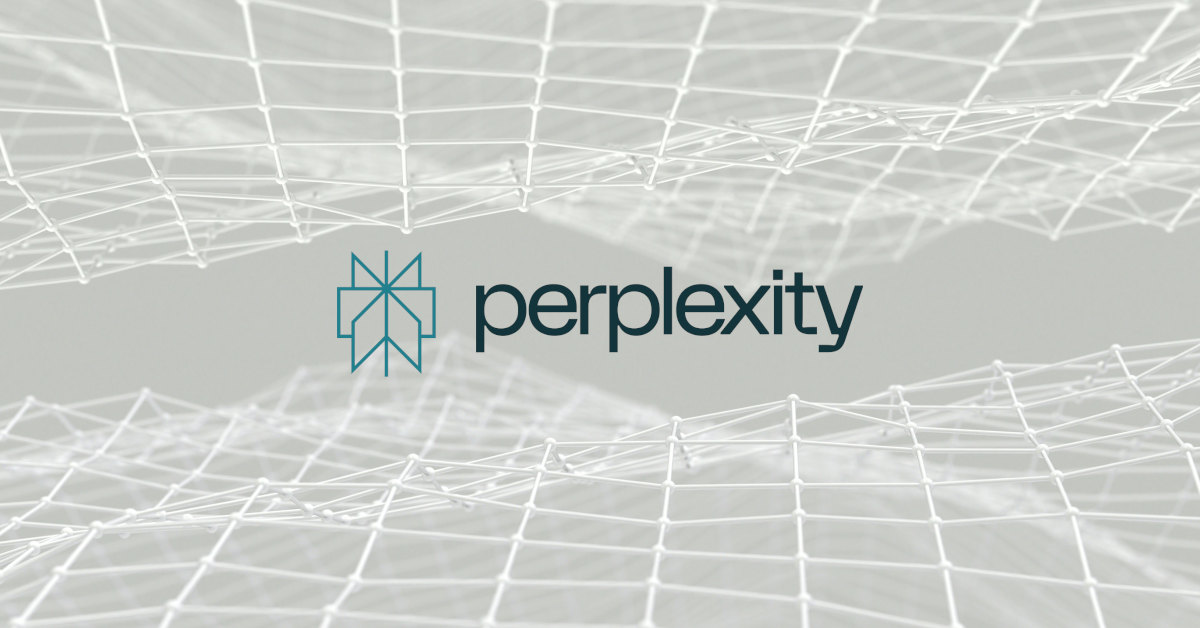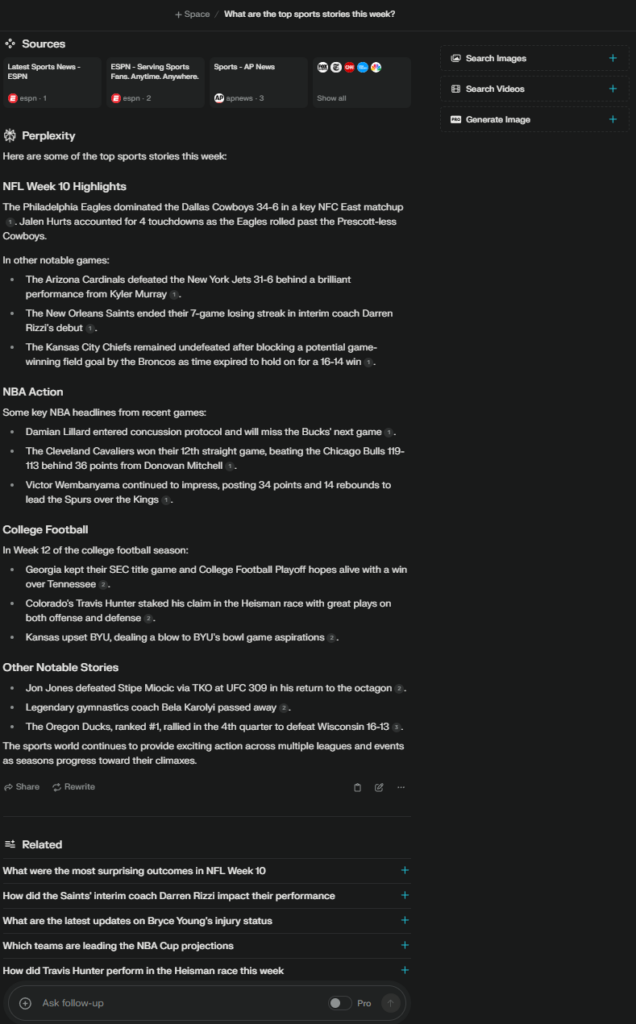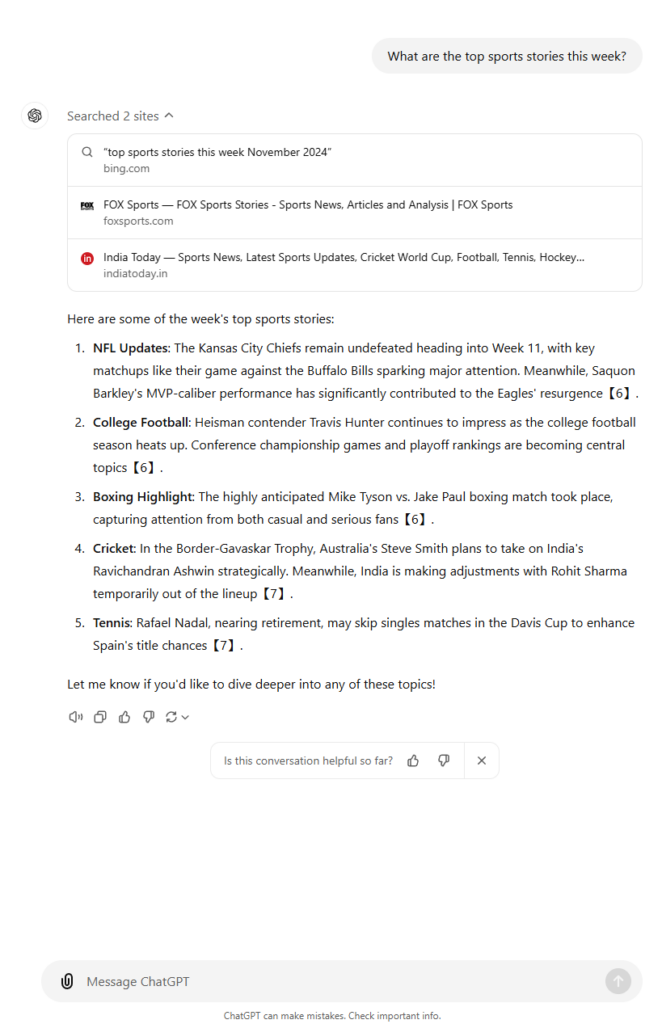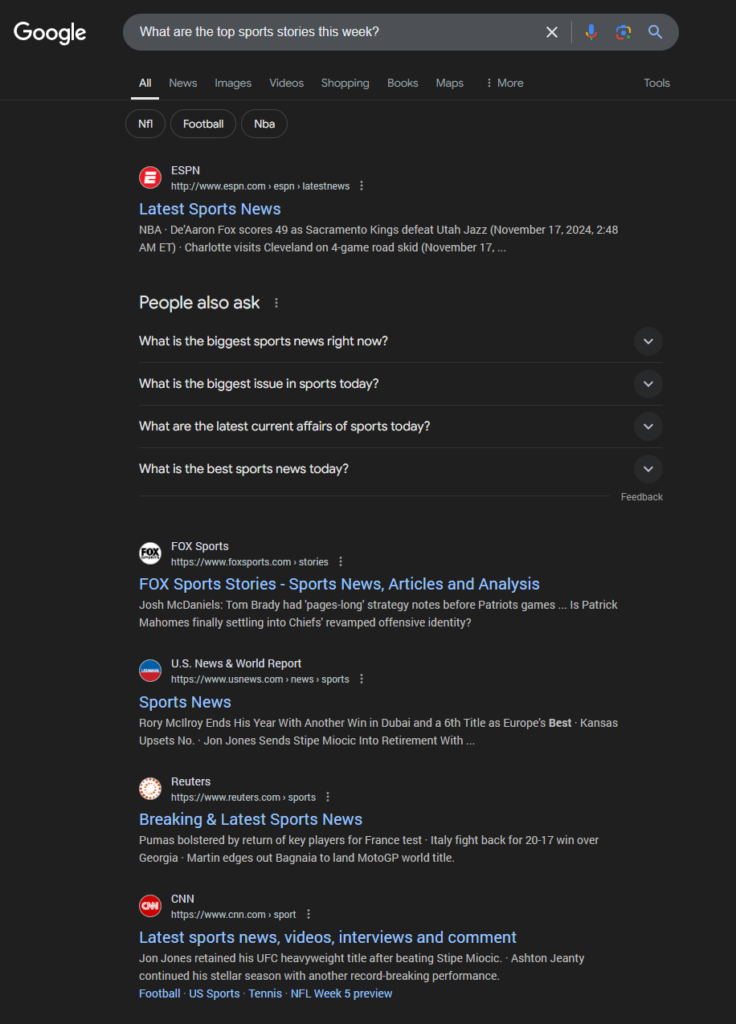
Perplexity AI Explained: The Next Frontier in Web Search
What is Perplexity?
Perplexity is a web app that describes itself as an “AI-powered Swiss Army Knife for information discovery and curiosity”. It’s a strong competitor to Google composed of a search engine with real-time web search capability and a chatbot powered by ChatGPT.
Perplexity strikes a great balance between traditional search engines like Google and AI chatbots like ChatGPT. It takes the best features of each and combines them to make a powerful research tool. It provides faster, more personalized, cited, and relevant answers to your queries.
Let’s see an example
The best way to demonstrate Perplexity is to show you how it works. In this example, I’ll compare the results for one simple query from Perplexity, Google search, and ChatGPT. As a casual user, I’d like to know “What are the top sports stories this week?”
Perplexity

In this example, make note of a few things: Sources at the top, in-line citations in the response body, and related questions at the bottom. We’ll discuss each of these in this blog.
ChatGPT

Notice that ChatGPT was able to access the internet and answer the prompt. However, the in-line sources aren’t clickable, which makes checking accuracy difficult. The response is also far shorter and lacks detail that Perplexity provided.
Google search

Google search results provide the least information of all three. To get the information I’d like, I have to select one of these links. Since each website is controlled by a unique third-party, there’s no guarantee I’ll be able to easily and quickly satisfy my question.
I’m sure we’ve all had the shared experience of trying to find a recipe via Google, only to have the first few results force us to scroll through the culinary equivalent of War & Peace. This is a direct consequence of keyword-bloat encouraged by the Google ranking algorithm. Perplexity renders such text unnecessary.
How does Perplexity compare to ChatGPT and Google?
Perplexity differs from ChatGPT and Google in a few major ways:
- Search-oriented, concise-focus – Perplexity is an alternative to traditional search engines like Google. It allows users to input a query and find the answer. The biggest difference is that Perplexity analyzes several results from the web and generates an answer to the query. In this regard, Perplexity is focused on providing concise, accurate answers rather than long form conversation like ChatGPT. This also contrasts with Google, which provides only a list of web links.
- Real-time information retrieval – ChatGPT has the ability to access the internet when prompted, but it’s not a primary purpose of the tool. As a result, ChatGPT responses that contain web-sourced information are not often robust enough to satisfy the query. Perplexity, on the other hand, keeps web-sourced traffic top-of-mind while generating answers. Responses from Perplexity are often longer, contain more details, and provide additional avenues for follow-up questions. Even with longer responses, Perplexity keeps a focus on conciseness, ensuring higher quality content than the often cyclical, repetitive answers offered by ChatGPT.
- Source citations – Perplexity offers more accurate and transparent answers by providing source citations in its replies. This is a must for more serious research. Sources allow users to easily verify the information provided.
- Focus filters – Perplexity users can narrow their searches to various types of sources. For instance, users can limit cited materials to academic material or social media content. They can set Perplexity to “Math” mode that provides enhanced mathematical capability, or they can disable web searching altogether.
- Related content – One of the best features in Perplexity is the Related section. In it, users are presented with a list of common follow-up questions. Each question generates an entirely new Perplexity query. There is no analogous feature in ChatGPT. Google has a “People also search” section, but it only considers one search result when answering.
How will Perplexity affect the future of search?
Searching the web hasn’t had a significant shakeup since Google came on the scene 25 years (a quarter century) ago. Perplexity takes the immense potential offered by AI and uses it to revolutionize search in several key ways:
Faster, less complicated user experience
Unlike traditional search engines, Perplexity only requires users to enter their query before returning the requested information. The selection of sources and evaluation of their trustworthiness is done automatically and instantly. For many use cases, this is acceptable. In cases where source credibility must be manually established, Perplexity provides links in a non-intrusive way. The effect of this improvement is greatly diminished time spent searching without a corresponding increase in hallucinations or misinformation.
Tailored responses
One of the most powerful capabilities of Perplexity is the ability to understand intent. Google understands only keywords. Perplexity’s integration of an AI LLM means users can provide context to their search, allowing for tailored responses otherwise impossible with traditional search.
This theme can also be seen in Related content. Google provides related searches on its results page, but these searches are correctly labelled “People also search for”. In other words, they’re not necessarily topics for which you would like to search. Perplexity can use its understanding of your intent to tailor Related content for you, the individual.
Less vulnerability to manipulation
The Google algorithm relies upon keywords to develop rankings. However, keywords don’t necessarily ensure relevance or trustworthiness. Grey hat or black hat webmasters can, and often do, stuff their sites full of keywords without offering relevant content. Google has taken steps to combat the most egregious offenses, but Perplexity only partially relies upon traditional keyword algorithms. By factoring several sources into one answer, Perplexity is able to sidestep many of the problems that come with this approach.
What challenges does Perplexity face?
Despite its promise, Perplexity faces several challenges:
- Google has broad market dominance, brand verbification, and vast resources to fight competitors.
- Like most AI startups, copyright and legal issues are a significant risk that could halt operations on a dime.
- Despite the many features that combat misinformation and encourage trustworthiness, the internet is a messy place that won’t be so easily tamed. This is doubly true when one considers problems specific to AI, such as hallucinations or pure fabrication.
The Road Ahead
Perplexity will reshape the future of web searching. This revolution has already started. With a combination of natural language processing offered by AI models and real-time information retrieval focused on user intent, it offers a compelling alternative to Google’s established search paradigm.
In it lies potential to redefine how people interact with the web. Such an evolution would lead to a more efficient, transparent, and user-centric approach to information discovery. With enough traction, Perplexity could become the preferred method for navigating the internet. Inside this promise, society would find a more personalized and insightful portal to knowledge of the world.